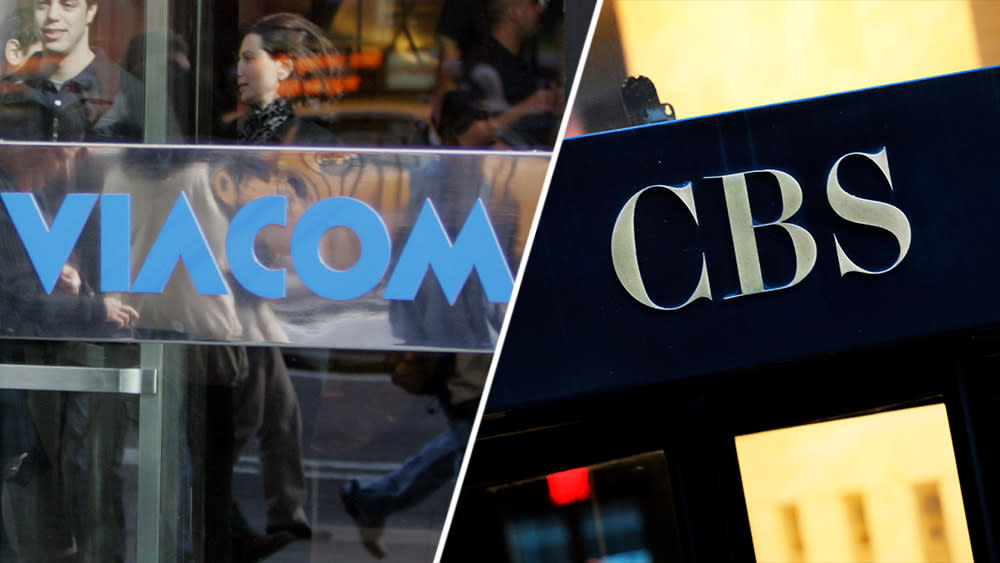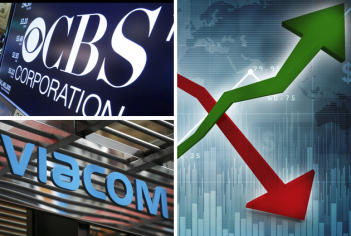Viacom And CBS Get Battered As Stock Market Shows Signs Of Recession – Update

Click here to read the full article.
UPDATED with closing prices and additional details: Shares in Viacom and CBS both declined more than 8% Wednesday as investors absorbed the details of the companies’ long-awaited merger during a broader stock market retreat.
CBS stock closed at $44.62, 8% lower, and Viacom at $26.72, down 8.5%. Worries about weak economic data from China and Germany, as well as movement of Treasury bond yields, a key metric that can signal a potential recession, sent the Dow 30, Nasdaq and S&P 500 down sharply, with the Dow losing more than 800 points.
More from Deadline
'Bold & The Beautiful' Tops Soap Opera Demo For First Time After 32 Years On Air
Showtime & 'Billions' Producers Hit With Defamation Suit By Cayuga Nation
Viacom Chief Bob Bakish Praises Troops At Town Hall After CBS Deal Reveal
President Donald Trump returned to his Twitter battle station, assailing “clueless” Federal Reserve policy as the root cause of the “CRAZY INVERTED YIELD CURVE” (capitals his).
In the media and tech sectors, Viacom and CBS took some of the biggest hits. The only other stocks as much in the red were Discovery, AMC Entertainment, Nexstar Media Group and Sinclair Broadcast Group, all down between 7%-9%.
Bundled into this grim macroeconomic portrait was the day-after verdict of the market on the Viacom-CBS merger, which was formally unveiled Tuesday. The long-awaited deal had long ago been priced in by most Wall Streeters. A day after the big reveal, though, the $30 billion, all-stock transaction has drawn some downbeat assessments from analysts, mostly on the CBS side. The main issue nagging at some analysts is the perceived risk of the merger tying an established, cash-generating larger player like CBS to the smaller and still-rebounding Viacom.

BMO Capital Markets downgraded CBS stock to “market perform,” with a new price target of $51.
Credit ratings agency Moody’s said it was putting CBS on review for a downgrade, and Viacom on review for an upgrade. The flag on the CBS side, Moody’s said, is due to “the decision by CBS to merge with a lower-rated and more weakly positioned Viacom. Viacom relies heavily on advertising and affiliate revenue from its large group of cable networks, which face mounting structural headwinds from accelerating pay-TV subscriber losses.” Moody’s did acknowledge improvement at Viacom as well as its streaming prospects, both as an ad-supported VOD operator and as a supplier of programming to subscription services, including CBS All Access.
Bank of America Merrill Lynch upgraded CBS to “buy” from “neutral,” and raised its price target to $63 from $58. Michael Nathanson of MoffettNathanson maintains a “buy” rating on CBS stock and rates Viacom’s “neutral.”
In a research note to clients, Nathanson highlighted what he called the “striking similarities” between the combined ViacomCBS and NBCUniversal. Nevertheless, he wrote, “judging by the tepid and languid [investor] reaction, the new company will have to work extra hard to prove the financial merits of this combination. While building out DTC platforms takes both time and money to prove, we think the biggest near-term opportunity is to reclaim the lost economics from the foolish decision to separate these assets out.”
Michael Morris of Guggenheim upped his 12-month price target for CBS, to $59 from $57. He also upgraded Viacom shares to “buy” from “neutral.” In a note to clients, Morris wrote, “We see the combined company as more strongly positioned to leverage its content pipeline to pursue incremental growth opportunities while maintaining a leadership position in linear video media.”
Cowen & Co.’s Doug Creutz issued a “modestly positive” reaction to the deal, preserving his “market perform” rating on CBS. Even so, he cautioned that integration challenges await, and he confessed to finding that after years of buildup, the strategic rationale struck him as “not terribly compelling.”
Worst of all, per Creutz? “That ugly portmanteau of a moniker,” he wrote in a research note. “Viacom is a name without a brand. CBS-Paramount, or Paramount-CBS, would have been a far better choice.”
Sign up for Deadline's Newsletter. For the latest news, follow us on Facebook, Twitter, and Instagram.

